Books I read this week: February week 1
These are the books I read last week. And one I finished today, but I’m including it because it works so well thematically. Â All three of these books deal with how we see other people, and how, ultimately, we never really know everything about anyone else.
Oh Dear Silvia by Dawn French (of French and Saunders fame) is about Silvia, who is in a coma after falling from a balcony. Over the course of her time in the hospital she is visited by her ex- husband, her housekeeper, her new age bohemian older sister, her estranged daughter, her best friend, and her nurse. Each of them talks to her, and their monologues make up the book. As we hear what they have to say to Silvia, a picture emerges- of her, of her life, of her loved ones. And then the picture starts to change as more is said, and we realize that none of these people has the whole picture except Silvia herself. By turns funny and sad and horrifying and then funny again, this was a great read. My only caveat is that one of the characters (the housekeeper) speaks English as a second language that her sons have taught her, and in true Dawn French form, her sons have taught her a very vulgar version of English, which she doesn’t realize is vulgar. It’s very Dawn French humor, but that’s not an element that I find particularly amusing, so the housekeeper’s sections weren’t my favorite to read, although they are really important to the overall story.
Swann by Carol Shields is also told from various perspectives. Four people are preparing to go to a symposium about a little known poet, Mary Swann. An uneducated woman, she delivered 125 poems to a small press publisher in her town and then went home and was murdered by her husband. Fifteen years later, her small book of poems, published posthumously, is found by an academic who focuses her study on them, and a small academic literary fire begins. Four sections, narrated by Sarah Maloney-the academic who “discovered” Mary Swann’s book, Morton Jimroy- an acclaimed biographer who is writing his next book about Mary Swann, Rose Hindmarch- Mary Swann’s only “friend”, and Frederic Cruzzi- editor and publisher of Mary Swann’s book, tell us more about the narrators than about Mary Swann, as they speculate and see the limited things they know about her life through the lens of their own experience. A sparse outline of Mary’s life comes into view as the book progresses, but what is seen in far more detail is a complex statement on how we read, how we view authorship and meaning, and how we approach interpretation. In one of the funnier sections, (in a funny haha, not funny hoho kind of way), Jimroy the biographer is laying forth his interpretation of a certain poem of Mary’s. The central image of the poem is blood, and he expostulates about religion and communion and a primitive connection Mary must have had to spirituality. Rose, the only of the characters to actually have ever met Mary, knows that Mary never attended church and suspects that the poem is actually about menstruation, but can’t bring herself to say the word or to contradict someone who she thinks is smarter than she is. It’s a clever moment in a book that hinges on people’s fundamental mistrust of their own readings of poetry. There’s also the ongoing problem that everything having to do with Mary Swann keeps disappearing- copies of her book are missing from libraries, academics’ notes are missing, personal effects stolen. It’s a fascinating book and I really really enjoyed it. I loved this quote:
In literature she sniffs a kind of godly oxygen that binds one human being to the next and shortens the distance we must travel to discover that our most private perceptions are universally felt.
Our inability to truly know someone else is at the center of Looking for Alaska by John Green. Miles arrives at boarding school and is immediately ironically nicknamed Pudge by his roommate, The Colonel, who is the ringleader of the majority of the mischief that goes on at the school. He is drawn into a group of friends, but he is drawn to none so much as the enigmatic Alaska. Mercurial and moody, Alaska is a hurricane while everyone else is a drizzle. She can be sweet and she can be mean, and at her core there is something horribly wounded.  Pudge himself is a collector of last words- he loves biographies and memorizes famous people’s dying words. The Colonel is close to a genius, and their days at school are filled with classes, drinking, playing pranks, and trying to not get caught breaking the rules. Every section of the first half of the book is headed by a count down- “one hundred thiry-six days before”,etc.  and the second half counts away from the central event of the book. Before and after, Pudge tries to understand himself, Alaska, and the answer to Simon Bolivar’s last words, “How will I ever get out of this labyrinth!”
This book deals with big questions, and isn’t afraid to say that there aren’t clear cut answers. Moments are heart wrenching without being manipulative, and while the answer to the central “mystery” is telegraphed fairly early on, it makes sense that the characters wouldn’t notice. While doing a search for a cover image for the book, I discovered that there is a lot of fan art and hand lettered versions of quotes from the book. I noticed this with Eleanor and Park as well, and I love that these books are connecting with their intended audience (they’re both “young adult” books) . I think this is one of the reasons why I get so particular about kids reading books that are age appropriate- when you read a book too early, you might comprehend the words and the plot, but that’s all you’re going to get out of it. When you read it at the right time (and that time is admittedly different for everyone, but 16 is way different from, say, 9), the words resonate like a tuning fork and the concepts and themes and truth of the book become a part of you and shape your life. So why not let them wait?
Some such quotes:
I wanted to be one of those people who have streaks to maintain, who scorch the ground with their intensity. But for now, at least I knew such people, and they needed me, just like comets need tails.
That is the fear: I have lost something important, and I cannot find it, and I need it. It is fear like if someone lost his glasses and went to the glasses store and they told him that the world had run out of glasses and he would just have to do without.
So that’s three books this week. I haven’t decided what to start next. What are you reading right now?

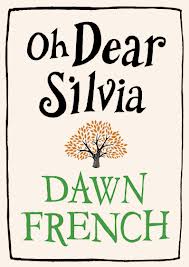

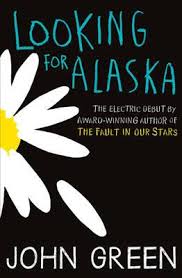
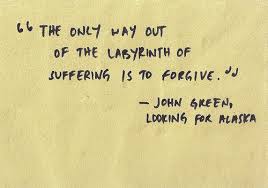
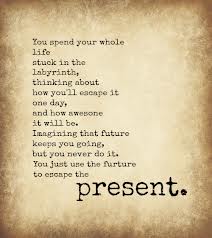
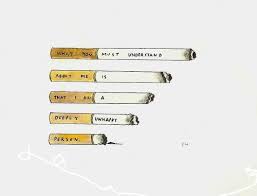
You inspire me with your constant reading :). My current: Yoga Anatomy, Food & Faith, Margaret Thatcher, Virginia Woolf a Writer’s Diary, and The Flavor Thesaurus; just finished Color Your Style, “Romeo & Juliet,” and Lean In.
I’m reading two right now: readalution book #3 is on my exercise bike (Running and Being…I think I hate it but we shall see) and Jesus on Every Page, about why Christians should read the Old Testament.